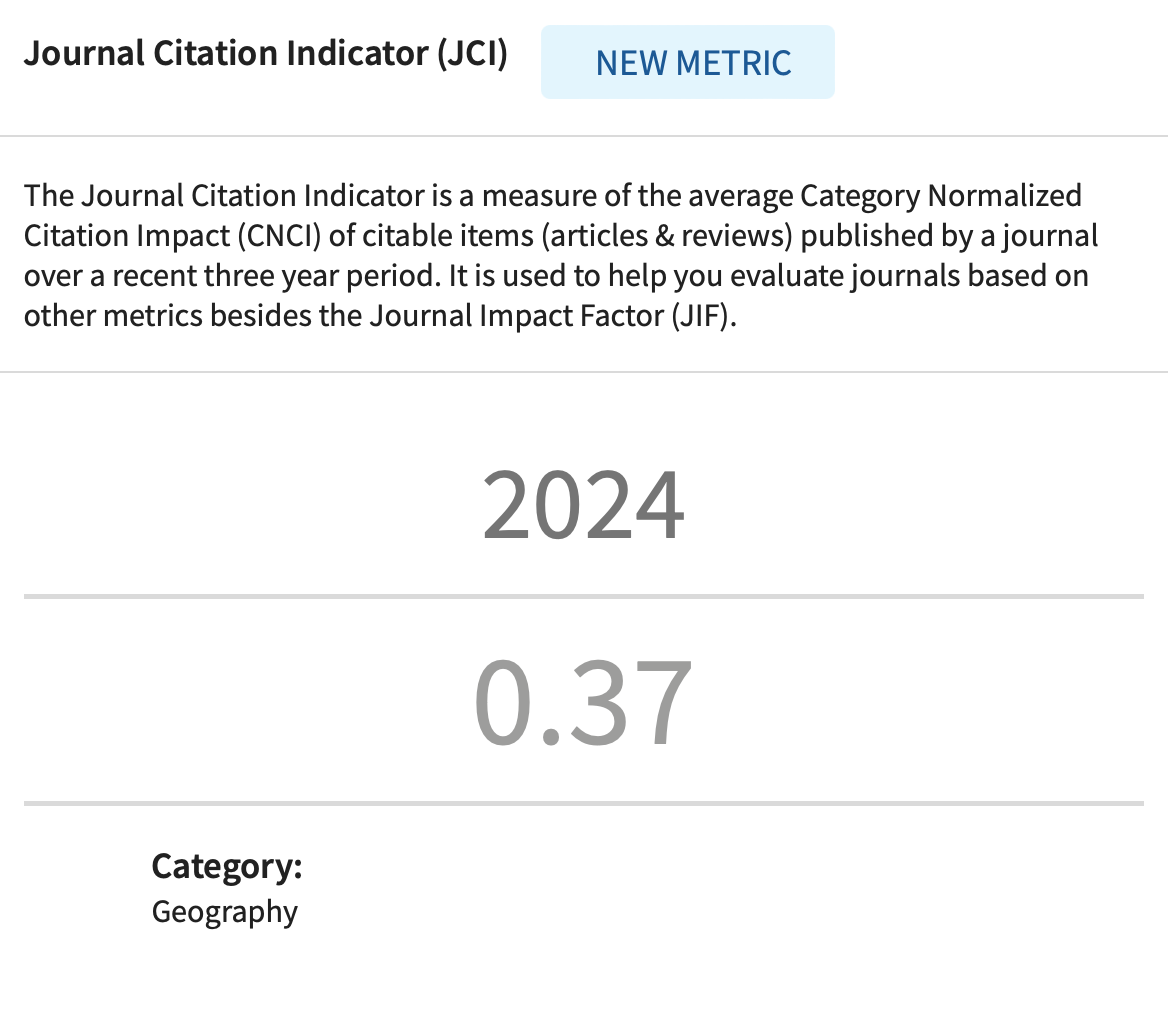READING THE SIBERIAN CITY-TEXT: SPATIAL SEMANTICS AND SEMIOTIC POLITICS OF URBAN TOPONYMIC LANDSCAPES IN YAKUTSK (RUSSIA)
DOI:
https://doi.org/10.2298/IJGI2302205LKeywords:
urban geography, spatial semantics, symbolic landscapes, urban place names, YakutskAbstract
The article studies the spatial semantics of Yakutsk’s urban text (Sakha/Yakutia, Russia) as a component of the cultural landscape. The research is based on the theoretical approaches of the Tartu-Moscow School of Semiotics, scholarly traditions of post-Soviet cultural (or the so-called “humanitarian”) geography, and modern critical studies of toponymy. The authors analyze spatial semantics and controversial elements of political and cultural symbolism of the urban text, which combines indigenous Yakut, Russian, and Soviet cultural components. With more than four hundred toponymic examples, this case study reveals the semiotic structure of Yakutsk toponymic system as a combination of urbanscape symbolization processes. For the first time, the article empirically shows, with the help of toponymy in the space of a post-Soviet city, the relationship, interaction, and positioning of the three cultures. In addition, the semantics of toponyms is typologized, which allows to quantitatively, qualitatively, and cartographically describe the process of “writing” the urban text.
Article metrics
References
Argounova-Low, T. (2011). The Politics of Nationalism in the Republic of Sakha (Northeastern Siberia) 1900-2000: Ethnic Conflicts under the Soviet Regime. The Edwin Mellen Press.
Azaryahu, M. (1990). Renaming the past: Changes in “city text” in Germany and Austria, 1945-1947. History and Memory, 2(2), 32–53. http://www.jstor.org/stable/25618598
Azaryahu, M. (1996). The Power of Commemorative Street Names. Environment and Planning D: Society and Space, 14(3), 311–330. https://doi.org/10.1068/d14031
Azaryahu, M. (2011). The Critical Turn and Beyond: The Case of Commemorative Street Naming. ACME: An International E-Journal for Critical Geographies, 10(1), 28–33. https://www.acme-journal.org/index.php/acme/article/view/883
Basik, S. (2020). Book review: Spaces and Meanings: Semantics of the Cultural Landscape. Cultural Geographies, 27(4), 680–681. https://doi.org/10.1177/1474474020909471
Basik, S., & Rahautsou, D. (2019). Toponymic Politics and the Symbolic Landscapes of Minsk, Belarus. Geographia Cassoviensis, 13(2), 107–120. https://doi.org/10.33542/GC2019-2-02
Creţan, R., & Matthews, P. W. (2016). Popular responses to city-text changes: Street naming and the politics of practicality in a post-socialist martyr city. Area, 48(1), 92–102. https://doi.org/10.1111/area.12241
Duncan, J., & Duncan, N. (1988). (Re)Reading the Landscape. Environment and Planning D: Society and Space, 6(2), 117–126. https://doi.org/10.1068/d060117
Ferguson, J., & Sidorova, L. (2016). What language advertises: ethnographic branding in the linguistic landscape of Yakutsk. Language Policy, 17, 23–54. https://doi.org/10.1007/s10993-016-9420-4
Ferguson, P. P. (1988). Reading City Streets. The French Review, 61(3), 386–397. http://www.jstor.org/stable/393158
Gerring, J. (2004). What Is a Case Study and What Is It Good for? The American Political Science Review, 98(2), 341–354. https://doi.org/10.1017/S0003055404001182
Ghulyan, H. (2021). Conceiving homogenous state-space for the nation: the nationalist discourse on autochthony and the politics of place-naming in Armenia. Central Asian Survey, 40(2), 257–281. https://doi.org/10.1080/02634937.2020.1843405
Gill, G. (2005). Changing symbols: The Renovation of Moscow Places Names. The Russian Review, 64(3), 480–503. https://doi.org/10.1111/j.1467-9434.2005.00371.x
Gnatiuk, O. (2018). The renaming of streets in post-revolutionary Ukraine: regional strategies to construct a new national identity. AUC Geographica, 53(2), 119–136. https://doi.org/10.14712/23361980.2018.13
Gnatiuk, O., & Melnychuk, A. (2022). Place names for sale: A place of Ukraine in the universe of toponymy commodification. Geografický Časopis/Geographical Journal, 74(2), 141–158. https://doi.org/10.31577/geogrcas.2022.74.2.07
Kaşikçi, M. V. (2019). The Soviet and the Post-Soviet: Street Names and National Discourse in Almaty. Europe-Asia Studies, 71(8), 1345–1366. https://doi.org/10.1080/09668136.2019.1641586
Kazakevich, A. (2011). Simvolika mesta: zabyvanie i fragmentacija «sovetskogo» v landshafte Minska [The symbolism of place: forgetting and fragmentation of the “Soviet” in the Landscape of Minsk]. Neprikosnovennyi Zapas, 6(80), 18–34. https://magazines.gorky.media/nz/2011/6/simvolika-mesta-zabyvanie-i-fragmentacziya-sovetskogo-v-landshafte-minska.html
Khokholova, I. S., Zamorshchikova, L. S., & Filippova, V. V. (2018). Indigenous place names: the cognitive-matrix analysis. XLinguae, 11(2), 275–291. https://doi.org/10.18355/XL.2018.11.02.22
Lavrenova, O. (2019). Spaces and Meanings: Semantics of the Cultural Landscape. Springer Cham. https://doi.org/10.1007/978-3-030-15168-3
Lavrenova, O., & Filippova, V. (2019). Toponimika v kul'turnom landshafte Jakutii: problema tekstualizacii [Toponymics of the сultural landscape of Yakutia: textualization issues]. Izvestiya Rossiiskoi Akademii Nauk. Seriya Geograficheskaya, 2, 129–136. https://doi.org/10.31857/S2587-556620192129-136
Lotman, Y. M. (1996). Vnutri mysljashhih mirov: chelovek – tekst – semiosfera – istorija [Inside the thinking worlds: human being – text – semiosphere – history]. Yazyki Russkoy Kul’tury.
Mamontova, N. (2022). Naming the Arctic and Siberia: The Role of Cartographic Agencies in the Soviet Toponymic Policy and Practice. In S. Basik (Ed.), Encountering Toponymic Geopolitics: Place-Names as a Political Instrument in the Post-Soviet States (pp. 120–136). Routledge.
Mamontova, N., & Thornton, T. F. (2022). The multiperspectival nature of place names: Ewenki mobility, river naming and relationships with animals, spirits, and landscapes. Journal of the Royal Anthropological Institute, 28(3), 875–895. https://doi.org/10.1111/1467-9655.13776
Marin, A. (2012). Bordering Time in the Cityscape. Toponymic Changes as Temporal Boundary-Making: Street Renaming in Leningrad/St. Petersburg. Geopolitics, 17(1), 192–216. https://doi.org/10.1080/14650045.2011.574652
Mitin, I. (2018). Constructing urban cultural landscapes & living in the palimpsests: A case of Moscow City (Russia) distant residential areas. Belgeo, 4. https://doi.org/10.4000/belgeo.28126
Mitin, I. (2020). Voobrazhenie i mnozhestvennost: Pereimenovanija kak faktor transformacii gorodskih kul'turnyh landshaftov [Imagination and plurality: Renaming as a factor in the transformation of the urban cultural landscapes]. In D. N. Zamyatin & I. G. Konovalova (Eds.), Kul’turnyi Landshaft: Evolyutsii i Revoliutsii Voobrazheniya [Cultural Landscape: Evolution and Revolution of Imagination, pp. 100–106]. Institut vseobschey istorii RAN.
Nikiforov, V. (2021, June 24). Jakutsk ne stal Tujmaada [Yakutsk did not become Tuymaada]. Kommersant. https://www.kommersant.ru/amp/4869869
Okruzhnaya Administratsiya Goroda Yakutska [The District Administration of the City of Yakutsk]. (n.d.). The City Today. Okruzhnaya Administratsiya Goroda Yakutska. https://yakutskcity.ru/yakutsk/
Palonen, E. (2008). The city-text in post-communist Budapest: Street names, memorials, and the politics of commemoration. GeoJournal, 73, 219–230. https://doi.org/10.1007/s10708-008-9204-2
Prokopiev, V. P. (2002). Proishozhdenie naimenovanij ulic i ploshhadej Jakutska [The origin of the names of Yakutsks’ streets and squares]. In V. N. Ivanov & U. A. Vinokurova (Eds.), Yakutsk: Istoriyq I Sovremennost’ (K 370-Letiyu Goroda) [Yakutsk: History and Modernity' (K 370-Letiyu Goroda), pp. 126–144]. Yakutskiy Filial Sibirskogo Otdeleniya RAN.
Rose-Redwood, R., Alderman, D., & Azaryahu, M. (2017). The urban streetscape as political cosmos. In R. Rose-Redwood, D. Alderman, & M. Azaryahu (Eds.), The Political Life of Urban Streetscapes: Naming, Politics, and Place (pp. 1–24). Routledge.
Rusu, M. S. (2019). Shifting urban namescapes: Street name politics and toponymic change in a Romanian(ised) city. Journal of Historical Geography, 65, 48–58. https://doi.org/10.1016/j.jhg.2019.07.001
Saparov, A. (2017). Contested paces: the use of place-names and symbolic landscape in the politics of identity and legitimacy in Azerbaijan. Central Asian Survey, 36(4), 534–554. https://doi.org/10.1080/02634937.2017.1350139
Stiperski, Z., Lorber, L., Heršak, E., Ptaček, P., Górka, Z., Kołoś, A., Lončar, J., Faričić, J., Miličević, M., Vujaković, A., & Hruška, A. (2011). Identity through Urban Nomenclature: Eight Central European Cities. Geografisk Tidsskrift-Danish Journal of Geography, 111(2), 181–194. https://doi.org/10.1080/00167223.2011.10669532
Sukneva, S., & Laruelle, M. (2019). A Booming City in the Far North. Sibirica, 18(3), 9–28. https://doi.org/10.3167/sib.2019.180302
Šakaja, L., & Stanić, J. (2011). Other(ing), self(portraying), negotiating: The spatial codification of values in Zagreb’s city-text. Cultural Geographies, 18(4), 495–516. https://doi.org/10.1177/1474474011414636
Toporov, V. N. (1983). Prostranstvo i Tekst [The Space and the Text]. In T. V. Civijan (Ed.), Tekst: Semantika i struktura [Text: Semantics and structure, pp. 227–284]. Nauka.
Vuolteenaho, J., & Basik, S. (2022). Onomaturgies of Toponymic Commodification in Minsk, Belarus. In S. Basik (Ed.), Encountering Toponymic Geopolitics: Place-Names as a Political Instrument in the Post-Soviet States (pp. 153–172). Routledge.
Vuolteenaho, J., & Berg, L. D. (2009). Towards Critical Toponymies. In L. D. Berg & J. Vuolteenaho (Eds.), Critical Toponymies: The Contested Politics of Place Naming (pp. 1–18). Ashgate.
Zakon o Naimenovanii Geograficheskih objektov [The Law on the Names of Geographical Objects], Prezident Rosii [President of Russia], No. 152-FZ (1997). http://www.kremlin.ru/acts/bank/11787
Downloads
Published
How to Cite
Issue
Section
License
Copyright (c) 2023 Journal of the Geographical Institute “Jovan Cvijić” SASA

This work is licensed under a Creative Commons Attribution-NonCommercial-NoDerivatives 4.0 International License.











